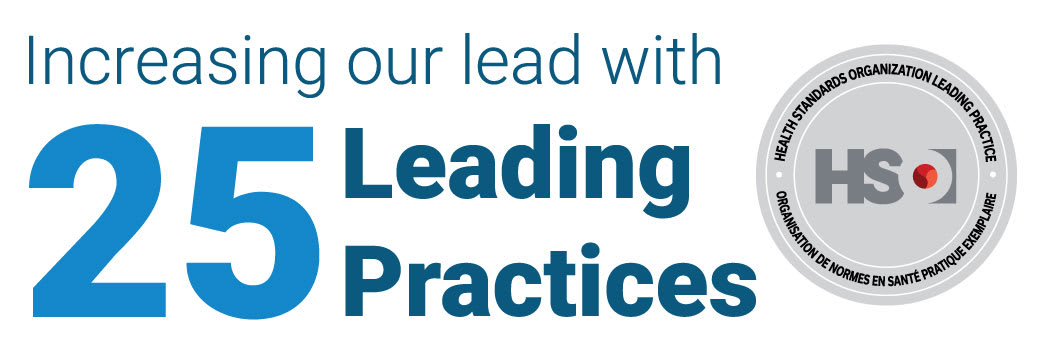Leading Practices
Share This Page
Share This Page

Our commitment to provide extraordinary caring to every person, every time is receiving international attention, demonstrating Niagara Health’s leadership in creating positive change in quality and safety.
We received international recognition by Accreditation Canada and the Health Standards Organization for 25 Leading Practices following a rigorous evaluation process. These practices are people- centred, safe and efficient, and healthcare institutions around the world can look to our practices to make improvements in quality, safety and the care experience.
Providing high-quality, safe care is the No. 1 priority of Niagara Health, and we’re very proud to share this summary of our Leading Practices.
ICU Research Program fosters research opportunities in the Intensive Care Unit of a community hospital.
Anterior Hip and Early Ambulation Discharge program built around an innovative hip replacement procedure that’s less invasive and decreases recovery time.
Be Kind, a respectful workplace strategy to promote a safe, caring and inclusive environment.
Difficult Airway Pathway program to treat difficult airway patients, saving precious time to improve patient outcomes.
The Essential Care Partner (ECP) program was developed and implemented at Niagara Health in January 2021. This pioneering program was co-designed with Patient Partners from the Niagara Health Engagement Network (NHEN), clinical frontline staff and leadership to allow meaningful support presence and an improved care experience. An ECP is a pre-approved individual, often a loved one or someone familiar with the patient, included in the circle of care. They have an integral role in supporting the patient’s care journey. Learn more
ED Familiar Faces Program was created as a result of several initiatives to reduce Emergency Department wait times, including the data analysis of the top 50 returning patients at Niagara Health's three hospital sites who have very complex care needs that are better suited to community services. The program provides these patients with alternative and more appropriate care pathways, patient support and follow-up.
Extraordinary U leadership program.
Fit2Sit for patients brought to the Emergency Department by ambulance and assessed to be well enough to transfer to a chair instead of unnecessarily waiting in a stretcher.
Innovative Injury Prevention and Return to Work Strategies.
Integrated Comprehensive Care (ICC) Program for Chronic Obstructive Pulmonary Disease and Congestive Heart Failure wraps care around the patient 24x7 by fully integrating the hospital and home-care teams.
Music and Memory program to increase quality of life for people with dementia.
Ontario Telemedicine Network in Mental Health and Addictions to increase healthcare access with telecommunications technology for patients who are unable to travel to the sites where services are offered.
Pain, Agitation and Delirium Management in the Intensive Care Unit to enhance the patient and family experience.
Patient Flow Simulation to reduce Emergency Department overcrowding.
Physician Reflective Review Tool supports the ongoing development and education of healthcare practitioners.
Rapid Access Addiction Medicine Clinic provides assessments and treatment for substance use.
Rapid Access to Addiction Medicine Peers is positioned in the Emergency Department, where Addiction Peer Support Workers provide comfort and self-efficacy while engaging clients who have long been conditioned to self-stigmatizing and shame-based responses to addiction so they have access to the right service at the right time. This program is the first peer program for Niagara Health.
Rapid Response Service: The Rapid Response Service conducts a phone follow-up 24 to 28 hours after discharge to bridge support between hospital and community for all clients discharged from inpatient mental health units and psychiatric emergency services.
Real-Time Patient Experience Surveying developed by our Information and Communications Technology team to understand the care experience for patients in real time and address any concerns on the spot.
Route NHS internal communications strategy to prepare for Accreditation in 2015.
Targeting Malnutrition Using the Integrated Nutrition Pathway which identifies at-risk patients and works with them on nutrition treatment plans.
Three Wishes Program comprised of acts of compassion for ICU patients and families.
Unit Based Teams, an Extraordinary Teams Strategic Plan initiative, to help improve work areas and increase patient safety.
We TOA for Physicians, a structured approach to improve the safe sharing and exchange of information during patient transitions.
Wellness Recovery Integrated Comprehensive Care Program supports clients living with complex mental health needs who have frequent presentations to the Emergency Department and inpatient mental health admissions. They work collaboratively to create a coordinated care plan and integrate the philosophy of recovery and evidence-based models of care to empower individuals to fully understand their mental health needs and identify and develop strategies to improve wellness.
